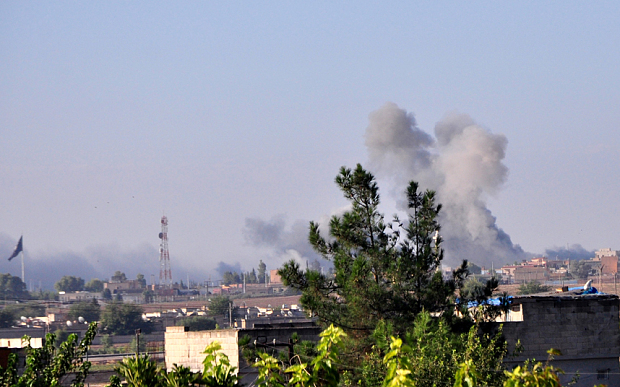Only a few years ago, reports about climate change driving people to commit crimes were the stuff of scorn – ridiculed by Tea Partiers like Herman Cain and the general public alike, even among those who would readily admit that people were the primary cause behind climate change and already anticipated the disastrous impact it would have on the weather and rising sea levels. Now, it might be time to take the warnings a bit more seriously. You might remember a story by Ray Bradbury about a particularly hot day – how more murders are committed at 92 degrees than at any other temperature, the peak of irritability.
It’s not quite what happened in Syria, but if you’ll consider the link between climate change and crop failures, it’s clear to see that climate change is inevitably impacting the economy for the worse – eroding coastal tourist attractions, cooking mollusks in the ocean’s increasing acidity and leading to prolonged droughts.
One of these droughts back in 2011 may have sparked the current civil war in Syria. As farms were overtaken with drought, the farmers fled to cities with their families, leading to crowding and gradual unrest, according to a recent study.
“Up until now we’ve understood and established that changes in climate may affect human conflict in the future. But everything until now has stopped short of saying climate change is already having an effect,” says Solomon Hsiang, a professor from University of California, Berkeley who has grown increasingly interested in the role climate change may have on violence. While there are a number of world leaders who have either denied climate science or remained largely apathetic about the problem, this new study could shed light on why they should pay attention – another complication that many people, scientists included, may have overlooked until now.
The authors of the new paper, published in Proceedings of the National Academy of Sciences this week does recognize a myriad of factors in the Syrian uprising. Among them were corrupt politcal leadership, inequality, massive population growth, and government incompetence in averting the crisis.
However, their main interest was a compilation of statistics which indicate that shortages of the water supply throughout the Middle East’s Fertile Crescent, an area that overlaps the borders of Syria, Iraq, and Turkey, was responsible for the deaths of livestock, hikes in food prices, sickened children, and also forced the migration of 1.5 million rural residents in Syria to the outskirts of their already crowded cities like Damascus. This massive exodus coincided with the end of the Second Iraq War — which also drove a number of Iraqi immigrants to urban areas throughout Syria.
After a careful examination of the meteorological data, these researchers concluded that the natural variability of drought season on its own failed to account for the trends in wind, rain, and heat which prolonged it. Along with high unemployment and bad government, the country was brought to violence.
“Being able to, in a specific region, draw this story line together we think is pretty significant,” said the study’s co-author Richard Seager, who works as a climate scientist at Columbia University’s Lamont-Doherty Earth Observatory. “The entire world needs to be planning for a drier future in that area. And there will be lots of global implications.”
Scientists as well as the U.S. military have been arguing for years that this increase in temperatures will eventually render tracts of land uninhabitable, as farms are built specifically according to their purposes. The result will be waves of refugees and continuous conflicts forming as natural resources become scarce. Until now, however, many scientists felt that the discussion was too politically charged, that these claims were based on speculation with little evidence to support them.
“There tends to be two points of view about this kind of research—either ‘that’s obvious’ or ‘that can’t be true,'” Hsiang says, praising the group’s efforts. “This paper is an important contribution. It’s building on a collection of results that has really gained a lot of momentum recently.”
The researchers decided to further investigate the outbreak of violence in a region already known for decades of conflict over scarce resources when it became apparent that the drought coincided with spiked violence in the region. “Then we looked at the fact that there had been this warming trend and drying trend, which takes moisture out of the soils at the same time,” Seager explained.
While the drought was normal for the season, Seager acknowledges, it was also one of the most severe on record, something that coincided with rising surface temperatures.
The research is not without its limits, something Seager is well aware of.
“All someone would have to say to criticize it is that all this would have occurred without the drought,” Seager says. “That may well be true. This regime was tremendously unpopular to begin with.”
Unfortunately, it is also a study that many researchers would not care to reproduce – waiting until there is another episode of siege and unrest somewhere else in the world before analyzing it. As unpopular or unstable as Syria’s government may be, however, its cities would not be dealing with massive migrations had there not been a drought, something that climate change definitely worsened.
|
James Sullivan
James Sullivan is the assistant editor of Brain World Magazine and a contributor to Truth Is Cool and OMNI Reboot. He can usually be found on TVTropes or RationalWiki when not exploiting life and science stories for another blog article. |

